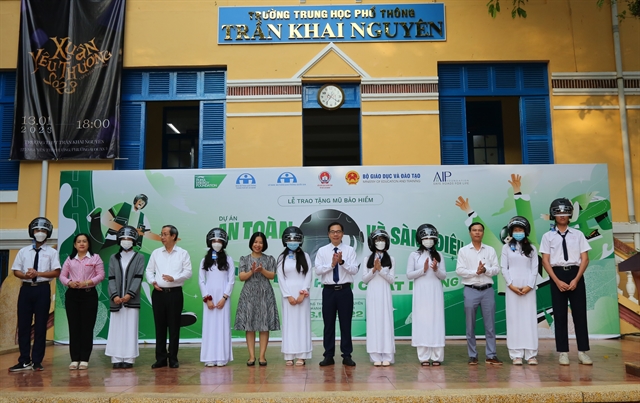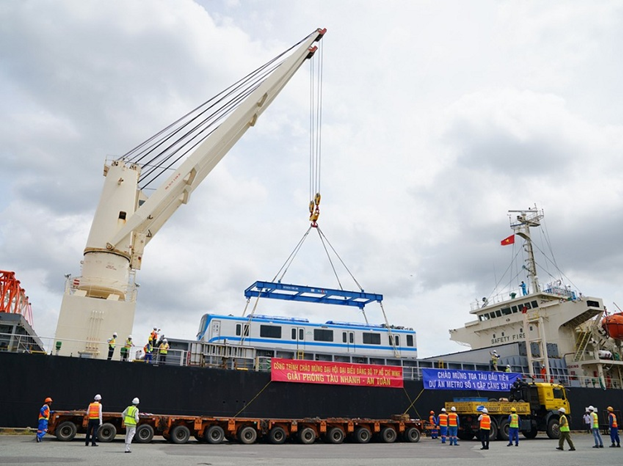 Society
Society


|
| The handover ceremony of quality helmets for students Trần Khai Nguyên High School in HCM City takes place on Monday. — Photo courtesy of AIP Foundation |
HCM CITY — AIP Foundation in collaboration with the Traffic Safety Committee and the Department of Education and Training of HCM City hosted a helmet handover ceremony at Trần Khai Nguyên High School on Monday.
Grade 12 students at the school will receive 750 newly produced ECE 22.06 United Nations Standard helmets, which can absorb higher values of energy that occur during an impact.
The activity is part of the Empowering Safety programme, supported by the Puma Energy Foundation.
This partnership between the Puma Energy Foundation and AIP Foundation contributes to the global Safe and Affordable Helmet Initiative in Việt Nam implemented by the Fédération Internationale de l'Automobile (FIA) and Protec. The initiative tackles the prevalence of non-standard low-quality helmets in low and middle-income countries while making safety more accessible in these countries by creating an affordable helmet that is adapted to local traffic environments.
“It is very exciting to see and participate in such a prestigious global ‘Empowering Safety’ initiative. The city education department is highly dedicated to ensuring that youth across the city have access to quality helmets that will protect them in a crash. With the meaningful and practical programme objectives, we hope to see this initiative expand to more schools across our city,” shares Trịnh Duy Tống, Head of Student Affairs Division, the Department of Education and Training of HCM City.
Safeguarding students on the road
Despite serving as Việt Nam’s financial and technological centre, HCM City continues to yield disproportionate risks to young road users – especially those living in low-income districts across the city.
A 2019 helmet study conducted by AIP Foundation in the city found that nearly 90 per cent of surveyed helmets were substandard, meaning they would not provide adequate head protection in the event of a crash.
The issue was that 25.9 per cent of the surveyed helmets were identified as “cap helmets,” which lack the foam lining needed to adequately protect wearers’ heads. By law, these cap helmets do not meet the satisfactory quality requirements as stated in National Technical Regulation. A further issue is that the study found that only 10.5 per cent of helmets in a representative sample of collected helmets were able to successfully pass impact absorption tests followed by government regulations.
Cracking down on low-quality helmet use
Việt Nam’s local and national governments are taking the lead in cracking down on low-quality helmets. In October this year, an inter-sectoral plan was launched to improve the effectiveness of the execution of quality helmet regulation across the country.
The plan serves as a basis for further solutions to enhance the effectiveness of enforcing laws requiring the use of helmets under the National Technical Regulations for riders of motorcycles, mopeds, and e-bikes nationwide to ensure that every road user is better protected on the streets.
“With a road user population heavily reliant on the private use of motorcycles as a primary mode of transport, there is a critical need for helmet safety programming targeting youth in this city. One of the simplest and most effective measures that can be taken to prevent road fatalities is to use a helmet,” Mirjam Sidik, Chief Executive Officer at AIP Foundation, said.
Students at the school are already aware of the national helmet law in Việt Nam, but the ceremony will serve as an opportunity to raise awareness of the life-saving importance of quality helmet use.
“We are proud to support the launch of the Empowering Safety programme in Việt Nam as we strongly advocate for safer streets and a safer future for all young people. This initiative marks a significant first step to ensuring youth are better protected from the dangers they face on the road. Young people are our future,” shares Vincent Faber, Executive Director of the Puma Energy Foundation. — VNS




